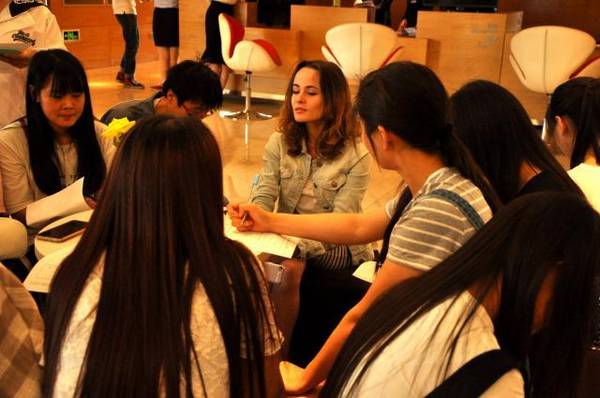本文是由自考365网校收拾的成人学士学位英语测验语法大全:时态,供泛博考生参考进修。
1、一般如今时
1)常常性或习气性的动作,常与暗示频度的时候状语连用。时候状语: every…,sometimes,at…,on Sunday.比方:I leave home for school at 7 every morning. 天天早上我七点分开家。
2)客观真谛,客观存在,科学究竟。比方:The earth moves around the sun. 地球绕太阳滚动。Shanghai lies in the east of China. 上海位于中国东部。
3)暗示格言或警语。比方: Pride goes before a fall. 骄者必败。注重:此用法若是呈现在宾语从句中,即便主句是曩昔时,从句谓语也要用一般如今时。例:Columbus proved that the earth is round. 哥伦布证明了地球是圆的。
4)如今时刻的状况、能力、性情、个性。比方:I don’t want so much. 我不要那末多。Ann writes good English but does not speak well. 安英语写得不错,讲的可不可。
2、一般曩昔时
1)在肯定的曩昔时候里所产生的动作或存在的状况。比方:时候状语有:yesterday,last week,an hour ago,the other day,in 1982等。比方:Where did you go just now? 适才你上哪儿去了?
2)暗示在曩昔一段时候内,常常性或习气性的动作。比方:When I was a child, I often played football in the street.
Whenever the Browns went during their visit, they were given a warm welcome. 当时,布朗一家不管何时去,都遭到强烈热闹接待。
3)句型:It is time for sb. to do sth “到……时候了”“该……了”
比方:It is time for you to go to bed. 你该睡觉了。
It is time that sb. did sth. “时候已迟了” “早该……了”
比方It is time you went to bed.你早该睡觉了。
would (had) rather sb. did sth. 暗示“甘愿或人做某事”。
比方:I’d rather you came tomorrow. 仍是来日诰日来吧。
3、一般未来时
1)shall 用于第一人称,常被will 所取代。will 在报告句顶用于大家称,在收罗定见时经常使用于第二人称。比方:Which paragraph shall I read first? 我先读哪一段呢?
Will you be at home at seven this evening? 今晚七点回家好吗?
2)be going to +不定式,暗示未来。
a. 主语的用意,行将做某事。比方:What are you going to do tomorrow?
b. 规划,放置要产生的事。
比方:The play is going to be produced next month.这出戏下月开播。
c. 有迹象要产生的事。
比方:Look at the dark clouds, there is going to be a storm.看那乌云,将近下雨了。
3)be +to表未来,按规划或正式放置将产生的事。
比方: We are to discuss the report next Saturday.咱们下礼拜六会商这份陈述。
4)be about to +动词真相,意为顿时做某事。
比方:He is about to leave for Beijing. 他顿时要去北京。
注重:
一、一般如今时暗示未来
1)以下动词come,go,arrive,leave,start,begin,return的一般如今时可以暗示未来,重要用来暗示在时候上已肯定或放置好的事变。比方:
The train leaves at six tomorrow morning. 火车来日诰日上午六点开。
When does the bus star? It stars in ten minutes. 汽车何时开?十分钟后。
2)在@时%5EVSe%候或前%V6EO8%提@句中。比方:
When Bill comes(不是will come),ask him to wait for me. 比尔来后,让他等我。
I’ll write to you as soon as I arrive there. 我到了那边,就写信给你。
二、用如今举行时暗示未来以下动词come,go,arrive,leave等如今举行时可以暗示未来:
I’m leaving tomorrow. 来日诰日我要走了。
4、如今举行时
a. 暗示如今(指措辞人措辞时)正在产生的事变。
比方:We are waiting for you. 咱们正在等你。
b. 习气举行:暗示持久的或反复性的动作,措辞时动作未必正在举行。
比方: Mr. Green is writing another novel.
他在写另外一部小说。(措辞时并未在写,只处于写作的状况。)
c. 暗示渐变,如许的动词有:get, grow, become, turn, run, go, begin等。
比方:The leaves are turning red. 叶子在变红。
It’s getting warmer and warmer. 天愈来愈热了。
d. 与always,constantly,forever 等词连用,暗示频频产生的动作或延续存在的状况,常常带有措辞人的主观色采。
比方: You are always changing your mind. 你总是扭转主张。
5、曩昔举行时
曩昔举行时暗示曩昔某一时候正在举行的动作,常和表曩昔的时候状语连用,如:
I was doing my homework at this time yesterday. 昨天的这个时辰我正在做功课。
They were expecting you yesterday.他们昨天一向在期待。
难点释疑:
when作并列连词,暗示“(这时候)忽然”之意时,第一个并列分句用曩昔举行时,when指导的并列分句用一般曩昔时。如: I was taking a walk when I met him.我正在溜达,忽然碰见了他。We were playing outside when it began to rain.咱们正在外边玩,这时候下起雨来了。
6、未来举行时
1)暗示未来某时举行的状况或动作,或按展
望未来会产生的事变。比方:
She’ll be coming soon. 她会很快来的。
I’ll be meeting him sometime in the future. 未来我必定去见他。
2)经常使用的时候状语有soon,tomorrow,this evening,on Sunday,by this time,tomorrow,in two days,tomorrow evening等。比方:
By this time tomorrow, I’ll be lying on the beach. 来日诰日此时,我正躺在海滩上呢。
注重:“主将从现原则”,主句用未来时,从句用一般如今时(取代一般未来时)When,as soon as,if,等指导的时候状语从句,前提句中,用一般如今时取代未来时。比方:He is going to visit her aunt t when he arrives in Beijing. 他一到北京,就去看他阿姨……
7、如今完成时
a. 如今完成时可暗示曩昔产生的动尴尬刁难如今所发生的影响,后面凡是不消时候状语,但句中常呈现already,just,yet等副词。如:
Someone has broken the window. 有人把窗户冲破了。
I’ve just finished reading the novel. 我方才读完这本小说。
Have you seen the doctor yet? 你看过大夫了吗?
注:already和yet用法上的区分already经常使用于必定句,置于句中。yet经常使用于否认句和疑难句,经常使用于句末。但already有时也可用语疑难句中表示诧异的心境。如:
b. 如今完成时也可暗示从曩昔某时起头的动作,状况一向延续到如今,常和for,since指导的时候状语连用。
如:I have learned English for 5 years. 
He has lived in Beijing since he was born.
注:(1)for和since指导的时候状语的区分: for + 一段时候,since + 一点时候从句(从句中经常使用一般曩昔时)。
(2)暗示继续的如今完成时也可和lately,recently,so far,up to now,till now,in the past (last) few years…, this week (month, year……), all day, all this week等时候状语连用。
如:Tom has had a toothache all day.I haven’t heard from him recently.
(3)如今完成时也可暗示从曩昔到如今曾履历过或做过的事变,常和often,ever,never,before,once,…times等时候状语连用。如:I’ve never been to Beijing.我从没去过北京。He has read this book before.
难点释疑:
1.点动词与持续性动词的区分。
所谓点动词是指含有终止或短暂意义的动词。如:begin,end,die,buy,borrow,come,arrive,join,marry 等动词。它们凡是不与暗示一段时候的状语连用。如: I have bought a book.我买了一本书。
I’ve had this book for three weeks.这本书我已买了三礼拜了。
2. have got的寄义。have got情势上是如今完成时,却和have是统一个意思She has got a slight temperature. She has a slight temperature.她有点发热。
三、用于如今完成时的句型It is the first / second time…that…布局中的从句部门,用如今完成时。比方:
It is the first time that I have visited the city. 这是我第一次拜候这都会。
This is the first time (that) I’ve heard him sing. 这是我第一次听他唱歌。
8、曩昔完成时
(1)暗示在曩昔某一时刻或动作之前完成为了的动作,即“曩昔的曩昔”。可以用by,before等介词短语或一个时候状语从句来暗示,也能够用一个暗示曩昔的动作来暗示,还可能经由过程上下文来暗示。
如:By nine o’clock last night, we had got 200 pictures from the spaceship. 到昨晚9点钟,咱们已收到200张飞船发来的图片。
(2)暗示由曩昔的某一时刻起头,一向持续到曩昔另外一时候的动作或状况,常和for,since组成的时候状语连用。
比方:I had been at the bus stop for 20 minutes when a bus finally came.
当车来的时辰,我在车站已等了20分钟。
He said he had worked in that factory since 1949.
他说自从1949年以来他就在那家工场事情。
(3)论述曩昔产生的事变,在已论述了曩昔产生的事变后,反过来追述或补述之前产生的动作时,常利用曩昔完成时。
比方:Mr. Smith died yesterday. He had been a good friend of mine.
史姑娘师长教师昨天归天了。他之前是我的老友。
I didn’t know a thing about the verbs, for I had not studied my lesson.
我对动词全无所闻,由于我没有好勤学习作业。
(4)在含有定语从句的主从复合句中,若是论述的是曩昔的事,先产生的动作经常使用曩昔完成时。
比方:I returned the book that I had borrowed. 我已奉还了我借的书。
She found the key that she had lost. 她丢失的钥匙找到了。
(5)曩昔完成时经常用在宾语从句(或间接引语)中,这时候从句中的动作产生在主句暗示的曩昔的动作以前。
比方:He said that he had known her well.他说他很认识她。
I thought I had sent the letter a week before. 我认为我一礼拜前就把信寄出去了。
(6)在包括有when,until等连词的复合句中
比方:When I woke up,it had already stopped raining.我醒来时雨已停了。
She didn’t go to bed until she had finished he work.她直到把事情做完以后才睡觉。
(7)动词think,want,hope,mean,plan,intend等用曩昔完成时来暗示曩昔不曾实现的设法,但愿,筹算或用意等。
比方:They had wanted to help but could not get there in time. 他们原本筹算去帮手,但没有实时赶到那边。
We had hoped to be able to come and see you. 咱们原本但愿能来看看你。
(8)曩昔完成时还可用在hardly…when…, no sooner…than…, It was the first (second, etc) time (that)…等固定句型中。
比方: Hardly had he began to speak when the audience interrupted him.他刚起头演讲,听众就打断了他。
No sooner had he arrived than he went away again.他刚到就又走了。
9、未来完成时
a. 状况完成:暗示某事继续到未来某一时为止一向有的状况。
比方:They will have been married for 20 years by then. 到当时他们成婚将有二十年了。
b. 动作完成:暗示未来某一时或另外一个未来的动作以前,已完成的动作或得到的履历。
比方:You will have reached Shanghai by this time tomorrow. 来日诰日此时,你已达到上海了
语法命题点及考点详情请进修教导课程>>







